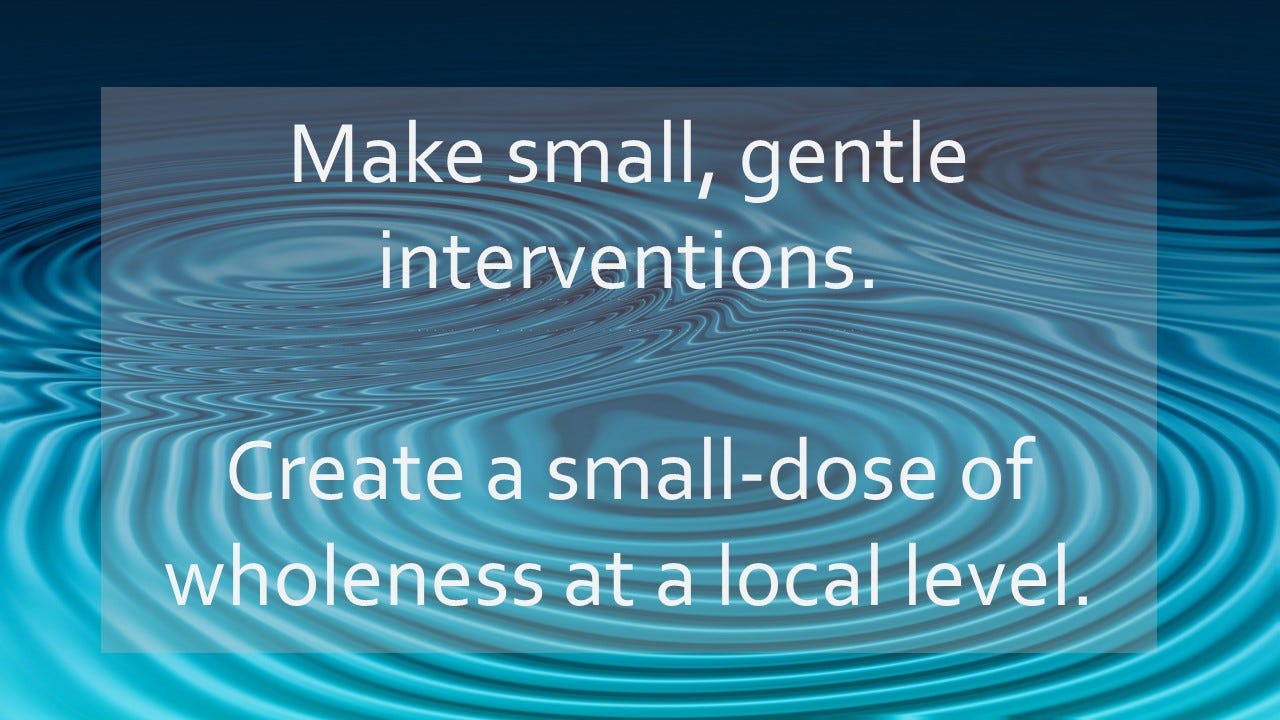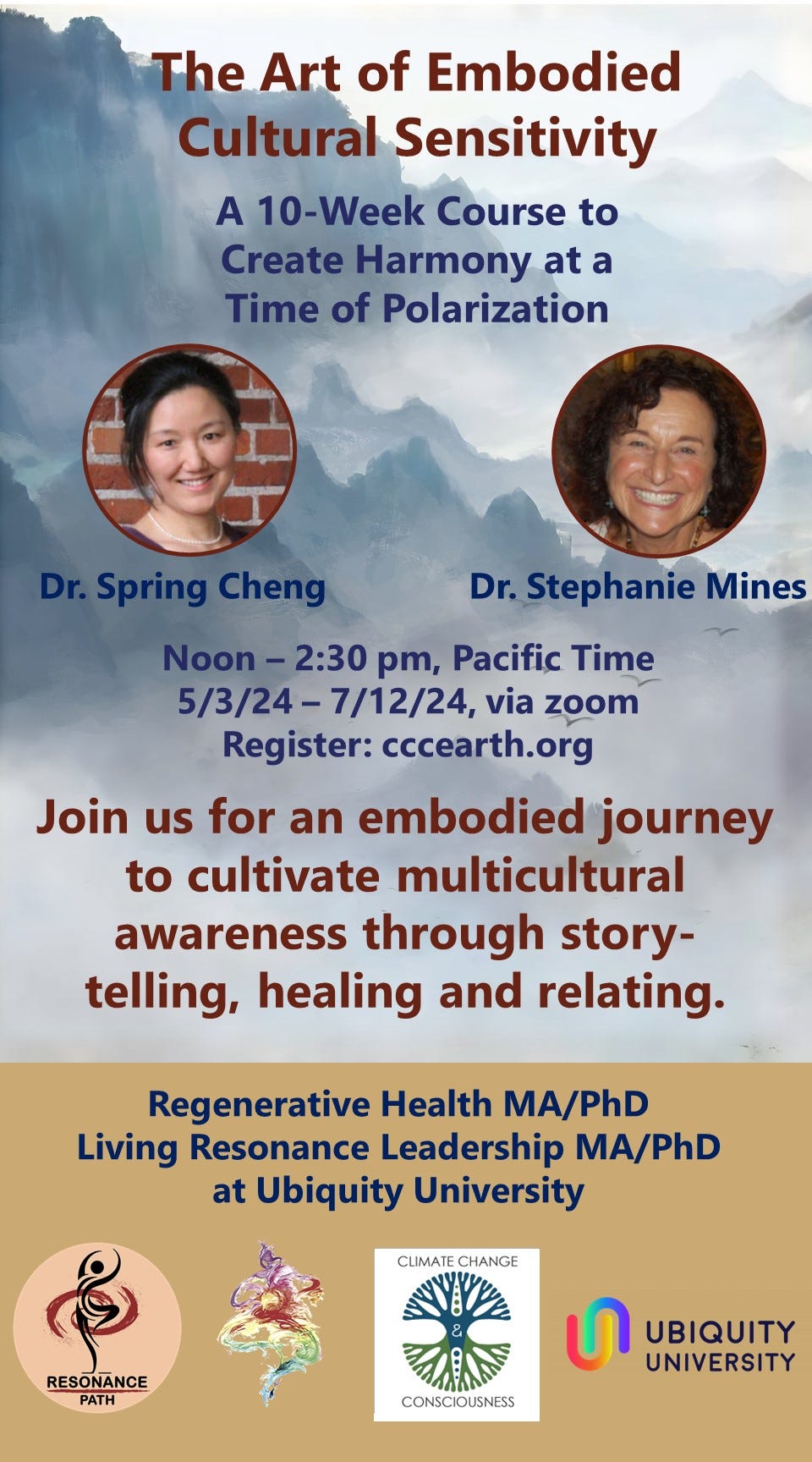We don’t believe that blaming and shaming the perpetrator can get us to where we want to go. What we feel compelled to do, instead, is to conduct experiments with the principles of holistic medicine, where we make small, gentle interventions to the system, and create a “micro-dose” of wholeness at the local level. This is the same principle of energy medicine employed by modalities such as acupuncture and homeopathy. - Spring Cheng
In this video, Dr. Stephanie Mines and I talk about the importance of going beyond blame and shame in cultivating embodied cultural sensitivity. This is the third installment of our series on this topic. (For the first two, please view Facing Justifiable Anger with Spaciousness and Transforming Rage into Sacred Songs.)
I talked about a social experiment I did in 2008 during a conflict between Chinese and Tibetans. The Chinese psyche is influenced by a painful collective trauma in the early 20th century, when the colonizing forces from the West, Russia and Japan pillaged and raped the Chinese land, brutalized people’s lives and destroyed Chinese pride in their ancestral lineage. Without a path to process these wounds, China re-enacted its trauma by acting violently towards Tibet, the next link on the chain of colonization. “Hurt people hurt people.” This conflict echoes with many geopolitical conflicts around the world such as the conflict happening in Gaza right now.
In 2008, this conflict heightened into the Chinese government’s violent clamp-down of a protest held by Tibetan monks in Sichuan Province. The major media of the west, ignorant of the collective wounding of the Chinese and blind to the larger context of colonization, launched a heavy attack blaming the Chinese, as a whole, as despicable villains. While the world grieved the tragic loss of lives, the arrogance of the western power and its hypocritical tendency to play judge while being unwilling to examine its own oppressive conduct, further polarized the situation, making things even worse. This is a typical role that western politics has played in the geopolitical conflicts around the world.
The Chinese and Tibetan communities living in Seattle, both feeling hurt and claiming roles of victims, held mounting animosities towards each other. At that time, I had strong connections with both communities and felt their pain at a personal level. In response to this crisis, I led a project called “Seattle Listens” to foster dialogue between these two communities. With a team of people, mostly third-party westerners, who are trained in Compassionate Listening, we held a series of “listening meetings,” where we gathered the Chinese and Tibetans separately to listen to their stories and empathize with their feelings.
Over the course of six months, trust was established between the listeners and each community. In the next two months, we were able to bring these two sides who were at war with each other together into the same room. They listened to each other’s stories, and for the first time, heard the other side of the story as a first-person account. They were able to empathize with the other side’s experience and viewpoints and see each other as human beings making best choices given the circumstances, just like they themselves do.
Blaming and shaming the perpetrator tends to be the first line of response when we see injustice. Our sense of morality, shaped by millions of years of evolution, exerts pressure onto the perpetrator’s psyche, urging them to stop the act of hurting.
However, moral force based on concepts such as good and evil, right and wrong, is no longer enough to dismantle oppressive and unjust social structures such as colonization, patriarchy or socio-economic constructs that extract resources in unsustainable ways. That is because this kind of moral force tends to set up a polarity between good and evil, right and wrong, victim and perpetrator. It does not probe into a much deeper underlying cause where good-and-evil, right-and-wrong can also be entangled and intertwined.
In this video, Stephanie and I, as holistic medicine practitioners, explore social change through a metaphor of healing. When a hurt happens, it is like the system is bleeding. Blaming and shaming function like coagulants that can stop bleeding right away. Blaming and shaming the perpetrator, in some instances, can exert moral forces to stop a perpetrator from continuing doing harm.
However, nowadays, the forces that exert harm are far greater than any individual’s conscious agency and will. Especially, politicians who hold visible power and status are subject to a complex web of political and economic factors, as well as psychological forces due to unexamined, unhealed ancestral and collective trauma. Furthermore, with the globalized economy, most of us, just by virtue of living a modern lifestyle, participate in the system of injustice. Many of us are becoming multi-racial, multi-cultural or simultaneously hold identities of privileged and marginalized. It’s no longer easy to make distinctions between perpetrator and victim.
We are not here to say we have a solution for this. Not at all. However, we don’t believe that blaming and shaming the perpetrator can get us to where we want to go. What both Stephanie and I feel compelled to do, instead, is to conduct experiments with the principles of holistic medicine, where we make small, gentle interventions to the system, and create a “micro-dose” of wholeness at the local level. This is the same principle of energy medicine employed by modalities such as acupuncture and homeopathy.
My “Seattle Listens” project was just a small experiment. One may argue that this kind of action will never change anything. I would even agree with that. One small instance of peace-making is not enough to counterbalance the gigantic forces of violence and eye-for-an-eye paradigms shaped by thousands of years of history.
However, I wonder what happens if the skills of peace-making, compassionate listening and generative dialogue become widely available to many more people – to households, at workplaces, in boardrooms and bedrooms? What if these skills are being taught to children at school and inmates in prisons? What if conflicts at many scales, from personal, to familial, to communal, are being met with compassion, listening, and facilitating of dialogue and collaboration between both sides? Will we begin to weave a new culture that moves towards peace, thriving and enlivened creativity, rather than nuclear war and genocide?
We will not know until we try, will we?
Will you join us? Please check out our new course launching in May: The Art of Embodied Cultural Sensitivity
Join us in the free, pre-course at noon - 1pm, Pacific time on Apr 19








